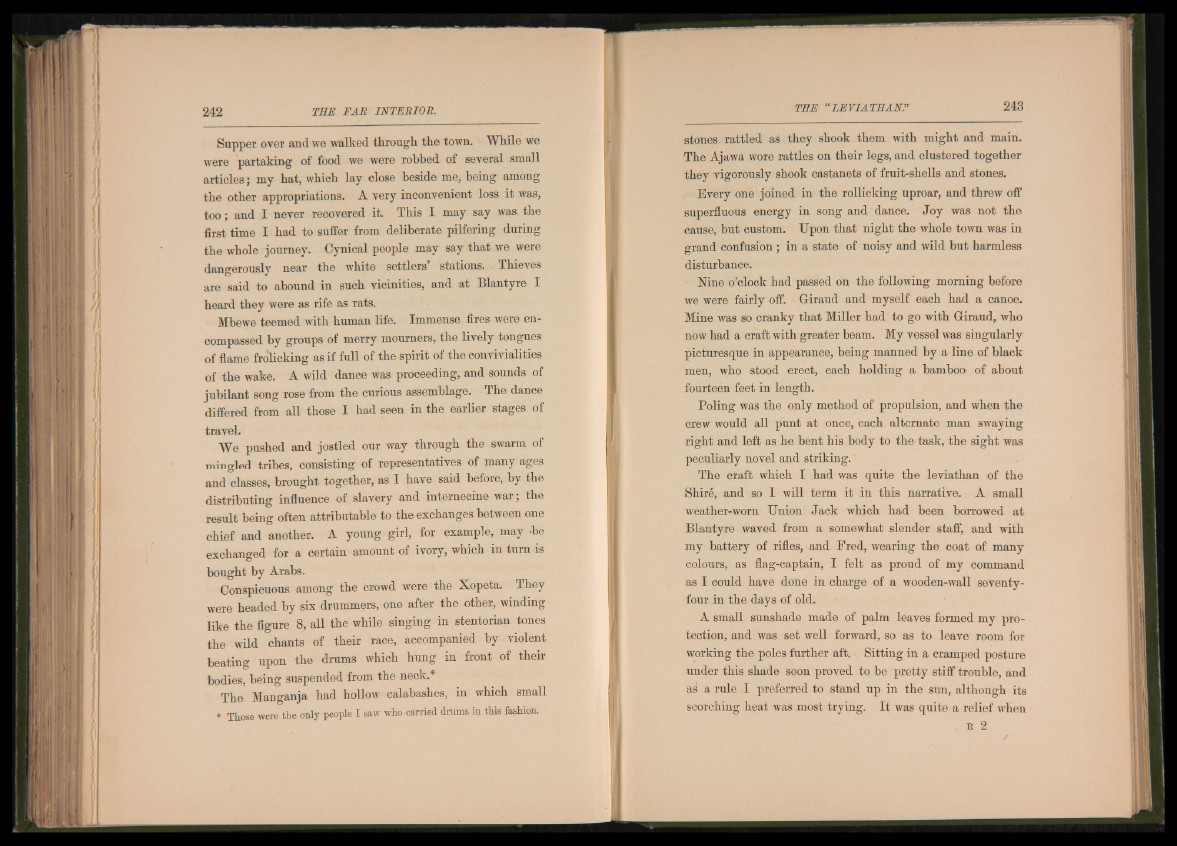
Supper over and we walked through the town. While we
were partaking of food we were robbed of several small
articles; my hat, which lay close beside me, being among
the other appropriations. A very inconvenient loss it was,
to o ; and I never recovered it. This I may say was the
first time I had to suffer from deliberate pilfering during
the whole journey. Cynical people may say that we were
dangerously near the white settlers stations. Thieves
are said to abound in such vicinities, and at Blantyre I
heard they were as rife as rats.
Mbewe teemed with human life. Immense fires were encompassed
by groups of merry mourners, the lively tongues
of flame frolicking as if full of the spirit of the convivialities
of the wake. A wild dance was proceeding, and sounds of
jubilant song rose from the curious assemblage. The dance
differed from all those I had seen in the earlier stages of
travel.
We pushed and jostled our way through the swarm of
mingled tribes, consisting of representatives of many ages
and classes, brought together, as I have said before, by the
distributing influence of slavery and internecine war; the
result being often attributable to the exchanges between one
chief and another. A young girl, for example, may -be
exchanged for a certain amount of ivory, which in turn is
bought by Arabs.
Conspicuous among the crowd were the Xopeta. They
were headed by six drummers, one after the other, winding
like the figure 8, all the while singing in stentorian tones
the wild chants of their race, accompanied by violent
beating upon the drums which hung in front of their
bodies, being suspended from the neck.*
The Manganja had hollow calabashes, in which small
* Those were the only people I saw who carried drums in this fashion.
stones rattled as they shook them with might and main.
The Ajawa wore rattles on their legs, and clustered together
they vigorously shook castanets of fruit-shells and stones.
Every one joined in the rollicking uproar, and threw off
superfluous energy in song and dance. Joy was not the
cause, but custom. Upon that night the whole town was in
grand confusion ; in a state of noisy and wild but harmless
disturbance.
Nine o’clock had passed on the following morning before
we were fairly off. G-iraud and myself each had a canoe.
Mine was so cranky that Miller had to go with Giraud, who
now had a craft with greater beam. My vessel was singularly
picturesque in appearance, being manned by a line of black
men, who stood erect, each holding a bamboo of about
fourteen feet in length.
Poling was the only method of propulsion, and when the
crew would all punt at once, each alternate man swaying
right and left as he bent his body to the task, the sight was
peculiarly novel and striking.
The craft which I had was quite the leviathan of the
Shire, and so 1 will term it in this narrative. A small
weather-worn Union Jack which had been borrowed at
Blantyre waved from a somewhat slender staff, and with
my battery of rifles, and Fred, wearing the coat of many
colours, as flag-captain, I felt as proud of my command
as I could have done in charge of a wooden-wall seventy-
four in the days of old.
A small sunshade made of palm leaves formed my protection,
and was set well forward, so as to leave room for
working the poles further aft. Sitting in a cramped posture
under this shade soon proved to be pretty stiff trouble, and
ai a rule I preferred to stand up in the sun, although its
scorching heat was most trying. It was quite a relief when
R 2